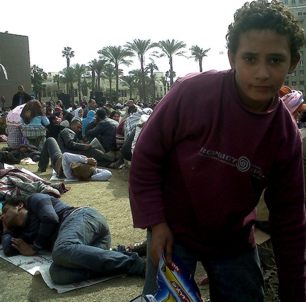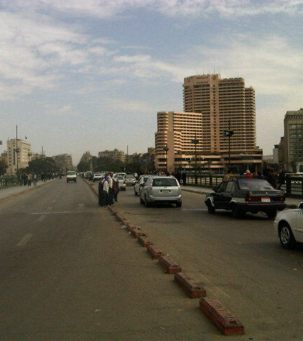|
Egypt Politics | Economy - Development Egypt banks reopen as protests continue
"I'm in Tahrir. Still lively as ever. street art spells out 'leave' in Arabic and 'Go' in English," journalist Sharif Kouddous reports from the central Cairo square today. Indeed, pro-democracy protesters are streaming into the square, but not in the numbers as on Friday. Concerts and other events are planned for the whole afternoon and evening.
As the most important signal, banks were ordered to reopen today after having been closed for over one week due to the unrest. Normal citizens will welcome the move, as they have been unable to withdraw cash since the protests started. The reopening of banks will ease the restoring of normal trade all over Egypt, with shops and businesses being able to return to normality. More people will be able to go back to work, leaving fewer in the streets to protest. While the move is an important display of normality, Egypt's economy however is far from normal these days. It is estimated that the political crisis has cost Egypt around US$ 3.1 billion since the protest movement started on 25 January. Especially the tourism sector is hard hit and will remain so for a longer time. The Red Sea resorts Sharm-el-Sheikh and Hurghada have been mostly evacuated. Famous excursion sites such as Luxor and Giza are no-go zones for the few remaining tourists. Egyptian state TV's repeated anti-foreigner reporting has led to widespread attacks on everybody looking non-Egyptian, especially in Cairo and Alexandria and will contribute to a long-time negative effect on tourism to these two major cities. European charter companies meanwhile mostly have cancelled all planned trips to Egypt until March or April. Unemployment therefore is foreseen to continue to grow as long as the political impasse is maintained. By staff writers © afrol News - Create an e-mail alert for Egypt news - Create an e-mail alert for Politics news - Create an e-mail alert for Economy - Development news
On the Afrol News front page now
|
front page
| news
| countries
| archive
| currencies
| news alerts login
| about afrol News
| contact
| advertise
| español
©
afrol News.
Reproducing or buying afrol News' articles.
You can contact us at mail@afrol.com









